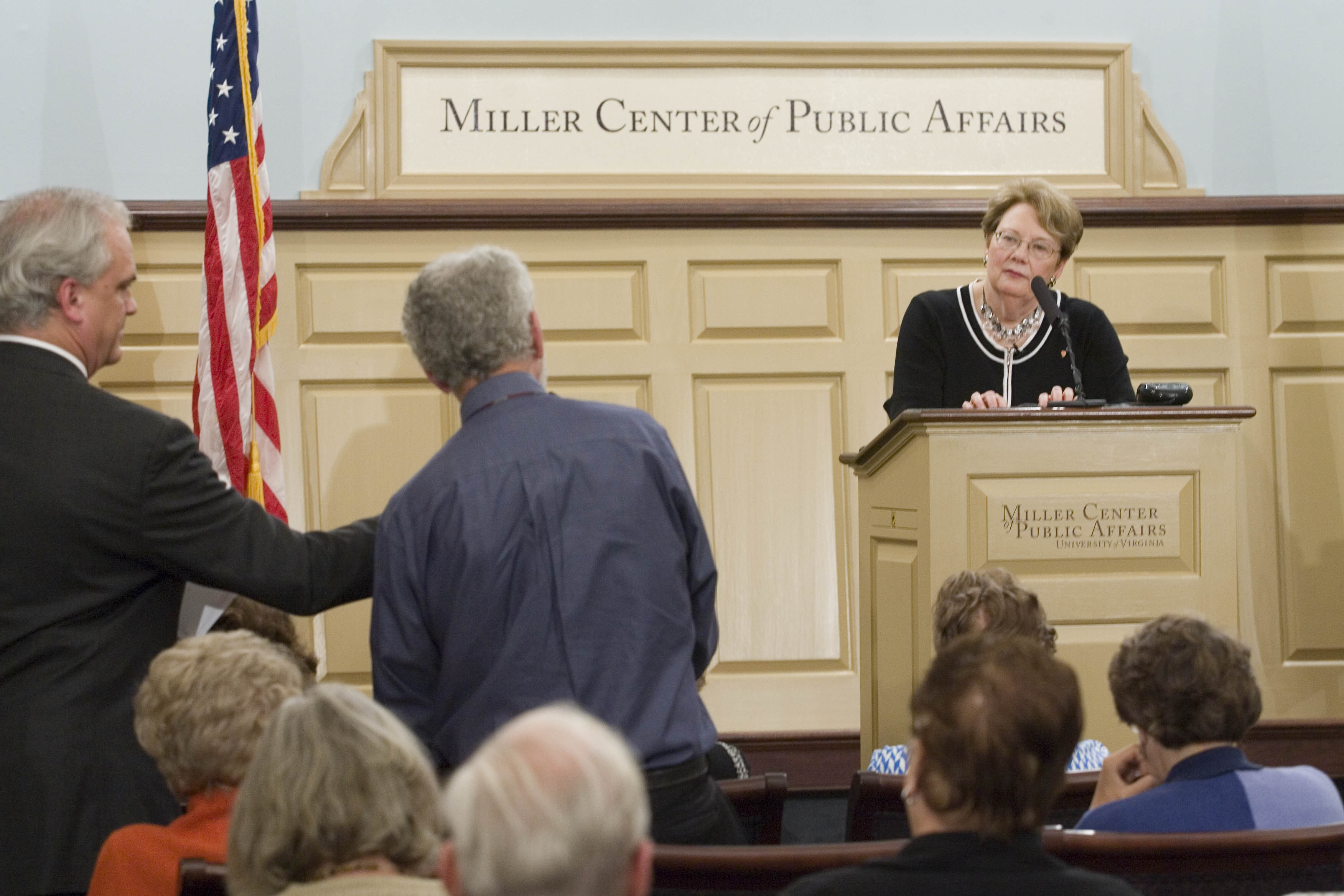In her talk Wednesday at the University of Virginia’s Miller Center Forum, President Teresa A. Sullivan invoked another president who faced a divisive atmosphere: Abraham Lincoln.
During the Civil War – 150 years ago in July – Lincoln signed into law the Morrill Act, which created America’s system of land-grant universities. Its sponsor, Congressman Justin Morrill of Vermont, pushed ahead despite the war.
“In the midst of all that divisiveness and strife, Congressman Morrill, President Lincoln and others saw the necessity of building a strong public higher education system to undergird national prosperity,” Sullivan said.
Today’s political divisiveness requires that kind of courage, she said. “The anniversary of the Morrill Act should remind us what can happen when we make public higher education a national priority, and what could happen now if we were to make a similarly strong commitment,” she said.
At the same time, higher education leaders can’t sit around and wait for legislators, the president said, and she spent about half of her talk on what she called “The Way Forward” for U.Va. and the pressing issues that must be addressed, and addressed soon: faculty, curriculum and research.
Sullivan was making her second Miller Center appearance, which was moderated by Douglas A. Blackmon, the chair of the forum program. The overflow crowd offered her a standing ovation, and asked some pointed questions – some of which had been delivered via Facebook and Twitter. About 100 viewers watched the live web stream.
At the Board of Visitors meeting this week, the president said, she will present a multi-year plan to make sure U.Va. is competitive when it comes to hiring and retaining faculty in an era when Baby Boomer faculty are retiring in droves and “everyone will be hiring in the years ahead.” Each hire, she said, will be approached strategically, through the lens of cross-disciplinary collaboration.
Maintaining the liberal arts curriculum – a U.Va. strength – is important, she said. Not only do students have to learn practical knowledge and skills and be fluent in new technologies, they must also demonstrate critical thinking skills, leadership and resilience.
Addressing the higher education move to online education, Sullivan said the University is flexing its technological muscles through “hybrid” courses proposed by faculty members for this fall, and through its partnership with the online education company, Coursera. At the same time, Sullivan said, U.Va.’s signature residential experience will maintain its unique character, offering students opportunities for self-governance, leadership, volunteering and other options.
In the research arena, U.Va. offers the best of two worlds: the size of a liberal arts college with the intellectual resources of a major research university. The opportunity for U.Va. is to think strategically about those research areas in which the University could stand out, Sullivan said.
“One major opportunity for U.Va. lies in Big Data. That’s the term that describes the massive, complex data sets that are realities of our modern world,” she said. Developing tools to manage, secure, mine and manipulate such data will be a global priority, she said.
A strategic plan will be put before the board by the end of the academic year, Sullivan said. The process will engage all of U.Va.’s stakeholder groups. “This will be a thoughtful, deliberative process, but it will move briskly,” she said. Because of the ongoing nature of planning, J. Milton Adams has been named senior vice provost, “and he will continue to focus on implementation and continuous planning after we deliver this plan to the board,” Sullivan said.
Blackmon started the questions by observing that it’s remarkable that Sullivan and Rector Helen E. Dragas are both still here following June’s leadership crisis. “What can you tell us about your relationship?” he asked.
“The rector and I both continue to work in the best interests of the University,” Sullivan said. “We may differ on how to get to the best interests, but with good will, we will get there.” She said one of her great challenges is communications with the board, considering a quarter of the members turn over every year and they have a large, complex institution to learn about.
Asked by history professor Mel Leffler about the “philosophical differences” cited as the reason for her resignation, she said the language in the press release was meant to summarize areas of difference. “I still don’t totally understand myself what the philosophical differences are,” she said.
Peter Norton, engineering professor and member of the Faculty Senate, asked Sullivan what she will do to defend and promote shared governance – which came into full flower as faculty rallied for her reinstatement.
“Shared governance is not done by many organizations in this economy,” Sullivan said. “The board needs to understand that our organizational culture is different. Different doesn’t mean wrong; it could mean it’s better.” The most important thing she does on a daily basis, Sullivan added, is to keep her faculty ties strong.
And yet, Blackmon pointed out, “You’re in a bit of a pickle, aren’t you?” (“Not for the first time,” Sullivan interjected.) “There are hard decisions you yet must make that will disappoint the faculty.”
Sullivan acknowledged that, and pledged to marshal the evidence on both sides of an issue before any decisions are made.
On a question about forgiveness and reconciliation from drama professor Gweneth West, past chair of the Faculty Senate, the president said it’s important not to carry emotional baggage from past issues. “An attitude of forgiveness helps us to see things from others’ point of view with some empathy,” she said. “A level of reconciliation and rapprochement is needed for us to move forward.”
Media Contact
Article Information
September 12, 2012
/content/us-should-commit-sustaining-public-higher-education-sullivan-says

